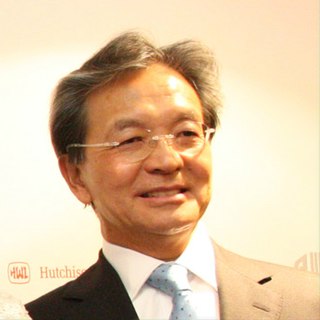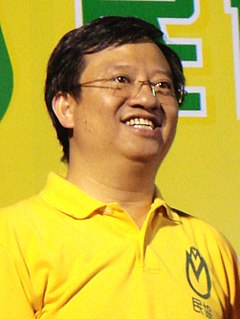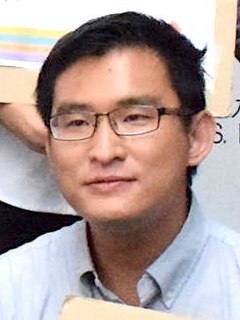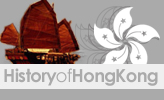
The United Democrats of Hong Kong was a short-lived political party in Hong Kong founded in 1990 as the united front of the liberal democracy forces in preparation of the 1991 first ever direct election for the Legislative Council of Hong Kong. It self-proclaimed as the first political party in Hong Kong. The party won a landslide victory by sweeping 12 of the 18 directly elected seats in the 1991 LegCo elections which shook the political landscape of Hong Kong. In 1994 it was merged with another pro-democracy party Meeting Point to form the contemporary Democratic Party.

The Hong Kong Civic Association is one of the longest-existing political organisations in Hong Kong. Established in 1954 by a group of teachers, professionals and businessmen, the Civic Association was one of the two semi-political parties to participate in the Urban Council elections since the 1950s, alongside Reform Club of Hong Kong. They were the only two organisations closest to the opposition parties dominated in the post-war colonial period before the expansion of the franchise in the 1980s.

The League of Social Democrats is a social democratic political party in Hong Kong established in 2006. Chaired by Avery Ng, it currently holds no seat in the Legislative Council of Hong Kong after the disqualification of its sole legislator Leung Kwok-hung, the key person in the party.

Paul Kwong is the incumbent Archbishop and Primate of Hong Kong Anglican Church, Bishop of Hong Kong Island, and Bishop of Macau. Kwong is also the current chair of the Anglican Consultative Council, as the first sitting primate to lead an ACC meeting. Kwong is also a member of the Chinese People's Political Consultative Conference (CPPCC) taking a pro-Beijing stance.

Jack So Chak-kwong, GBM, GBS, OBE, JP is the chairman of the Board of Airport Authority Hong Kong from June 2015. He is a former chairman and Executive Director of the Hong Kong Trade Development Council (HKTDC), former chairman and Chief Executive of the MTR Corporation, and former Deputy chairman and Group managing director of PCCW.
The Progressive Hong Kong Society was a political group in Hong Kong. It was established on 14 February 1985 by the then Executive and Legislative Council member Maria Tam. The party is considered conservative and pro-Beijing, in contrast to the pro-democracy forces which rose to prominence in the late 1980s and early 90s.
The Hong Kong People's Council on Public Housing Policy, formerly called the Hong Kong People's Council on Public Housing Policy, is a Hong Kong pressure group established in 1978 and was prominent in the 1970s and 80s. It was set up by a group of social activists from the residents' group and community organisations aiming at influencing Hong Kong Government's public housing policies and as a shadow council of the Hong Kong Housing Authority.
The Joint Committee on the Promotion of Democratic Government was an umbrella organisation representing various groups of the pro-democracy movement in Hong Kong. It was established on 27 October 1986 by 190 groups and led by the prominent pro-democracy figures Szeto Wah and Martin Lee. It demanded direct election in the 1988 Legislative Council, a "through train" arrangement for letting Legislative Council members elected in 1995 automatically becoming the members of the first legislature in the SAR government after 1997. They also demanded the Chief Executive to be elected by universal suffrage. It formed the backbone of today's pro-democracy camp as many of its key members formed the Hong Kong Alliance in Support of Patriotic Democratic Movements in China during the Tiananmen protests of 1989 and the United Democrats of Hong Kong for the first direct election in 1991.

The 1988 Hong Kong District Board elections were the third district board elections held on 10 March 1988. Election was held to all 19 districts of Hong Kong, for 264 members from directly elected constituencies while there were 141 appointed seats and respectively 30 and 27 ex officio members representing the Urban Council and rural committees in New Territories.

The 1985 Hong Kong District Board elections were the second district board elections held on 7 March 1985 for the all 19 districts of Hong Kong.
Desmond Lee Yu-tai is a retired Hong Kong politician, a member of Eastern District Council for most of a 30-year period and a former member of the Legislative Council of Hong Kong.
The Hong Kong Citizen Forum was a short-lived pro-Beijing political organisation in Hong Kong founded in 1991. Led by Gary Cheng Kai-nam. a school teacher from a traditional leftist school, the organisation was formed on 20 April 1991 in the background of the first direct election for the Legislative Council of Hong Kong in September.

Rosanda Mok Ka-han is a Democratic Party politician in Hong Kong. She is the former chairman of the pro-democracy pro-grassroots Hong Kong Association for Democracy and People's Livelihood (ADPL) and former member of the Kowloon City District Council for Ma Tau Wai.

Tam Kwok-kiu, MH, JP is a Hong Kong Association for Democracy and People's Livelihood (ADPL) politician in Hong Kong. He is the current member of the Sham Shui Po District Council, serving from 1985 to 2011 and again since 2016. He had also been chairman and vice-chairman of the council.
Jimmy Ng Wing-ka, JP is a solicitor and businessman in Hong Kong. He is the vice-president of the Chinese Manufacturers' Association of Hong Kong (CMAHK). In the 2016 Legislative Council election, Ng ran unopposed in the CMAHK's Industrial (Second) functional constituency, succeeding Lam Tai-fai in the seat.

Sze Tak-loy is a Hong Kong politician. He is currently chairman of the Hong Kong Association for Democracy and People's Livelihood (ADPL) and member of the Wong Tai Sin District Council for Tung Mei.
Tsin Sai-nin was a Hong Kong educator, unionist and politician. He was an elected member of the Urban Council, former president of the Hong Kong Chinese Civil Servants' Association and the founder of the Hong Kong Professional Teachers' Union (HKPTU).











